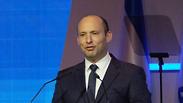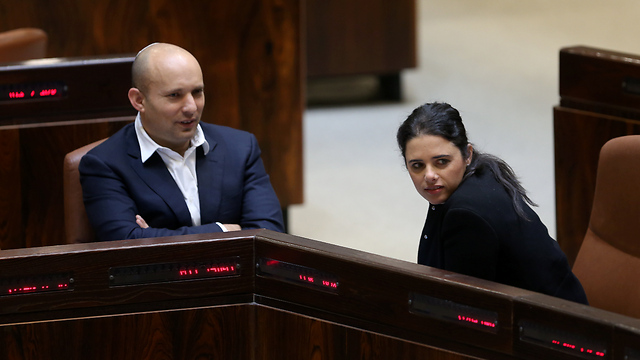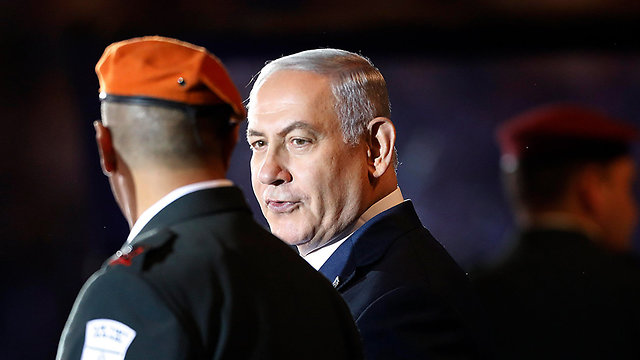
Bennett’s conditional stateliness
Op-ed: The Bayit Yehudi leader received well-deserved compliments for his stately speech at the Israel Prize ceremony. But stateliness is one value, and democracy is a different value. Bennett is willing to embrace all Israelis—or to be more accurate, all Israeli Jews—as long as they accept the policy he dictates to them.
The poor presence points to the Labor Party’s limited organizational abilities and to the low point it has reached on the Israeli street. It likely points to another, more alarming issue: Israelis simply don’t care.
The Labor Party urged its voters to flock to Jerusalem in light of the coalition’s discussion of the “notwithstanding clause.” Today, the High Court of Justice can strike down a law enacted by the Knesset if it contradicts basic laws. The Bayit Yehudi party wants to allow the Knesset to strike down a court’s decision to strike down a law. The pretext is the dispute over the decision to deport all African asylum seekers.

This is a deception. The dispute over the Africans is afflicted with flattery towards racist audiences of xenophobes, but that isn’t the main motive. Ministers Naftali Bennett and Ayelet Shaked seek to take advantage of the dispute over the Africans’ deportation to castrate the High Court’s restraining power. Next in line will be letting the settlements evade the law. It will be followed by the law enforcement system, and then by the status of the country’s minorities.
Shaked was appointed justice minister for this precise mission. She is doing her job diligently, seriously and in compliance with the law—just like other regimes we are familiar with from history.
The Israeli legal system, led by the Supreme Court, is not free of mistakes. There are things that should be fixed, there are things that should be balanced. But even the legal system’s harshest critics know it is the foundation for Israel’s existence as state based on the rule of law, as a democratic state. This power is being challenged by Bennett and Shaked.
Bennett received many compliments for his speech at the Israel Prize ceremony on Independence Day. The compliments were well-deserved: It was clearly a stately speech, the opposite of the tribal, divisive comments made by Prime Minister Benjamin Netanyahu, Culture Minister Miri Regev and others on the eve of the independence celebrations.
But let there be no confusion: Stateliness is one value, and democracy is a different value. Bennett is willing to embrace all Israelis—or to be more accurate, all Israeli Jews—as long as they accept the policy he dictates to them. His stateliness is conditional.

Netanyahu contributes an agenda of his own to the dispute over the notwithstanding clause. He doesn’t care about the asylum seekers’ future: When he reached a reasonable solution, he quickly changed his mind. He wishes to use the problem to impose elections on his coalition partners before being indicted.
It’s that simple. That’s why he is demanding an expansion of the notwithstanding clause till it reaches the point that Finance Minister Moshe Kahlon, the third hero in this saga, will be forced to dissolve the gvernment.
Kahlon isn’t interested in September elections. Neither is Bennett. They aren’t keen on being Netanyahu's suckers. In this battle, which is based solely on electoral considerations, the victim is the Supreme Court’s standing, and possibly even Israel’s continued existence as a state based on the rule of law.
The democratic rules of the game are now facing a crisis in many Western countries, from the United States to Poland and Hungary. Many of these countries’ citizens have had enough of democracy, of the constant debate, of the slow and complicated legal proceedings. They are sick and tired of what they see as the arrogance of a liberal, progressive, left-wing elite. They want a leader who will make decisions for them. They want a fiery rhetoric, not accountability. They hate—they hate foreigners, they hate minorities, they hate controversial comments. Social media has released their restrained urges. They are deluding themselves that lashing out at everything is the real freedom, the essence of democracy.
An integral part of this phenomenon is the leader’s cult of personality. Israelis have experienced eras of glorification of leaders—the Right glorified Ze’ev Jabotinsky and Menachem Begin, while the Left admired David Ben-Gurion. Bracha Habas wrote a booklet about Ben-Gurion titled “One and His Generation.” Someone distorted the headline, changing it to “One in a Generation.” It didn’t end well.
With Netanyahu, it can’t end any other way.










